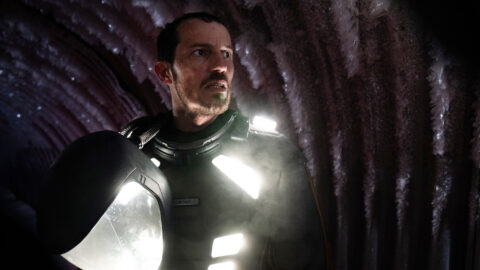If you press a note on the piano repeatedly, it doesn’t matter how softly or loudly you hit it, the melody will always be the same.
Eternal (Ulaa Salim, 2023) plays like this very note, plonking continuously (and rather annoyingly) in its fruitless search for science-fiction profundity; hampered by a lack of genre technicalities while the dramatic beats lack harmony, imagination and intrigue.
Playing in Big Screen competition like a strange marriage of The Core (Jon Amiel, 2003) and Interstellar (Christopher Nolan, 2014), it pales in comparison to the inherent strengths of both those bold sci-fi visions.
It starts promisingly enough, with an Icelandic man emerging from his house on the edge of a cliff, only to become the first witness of a potential world-ending event. A fissure has opened in the middle of the ocean. If society doesn’t do anything about it, we’re all doomed.
Every nation casts themselves as the saviours of the world. In this case, the Danish (ok?) are the ones with the scientific knowhow and willingness to head an international alliance to patch the fissure up. Otherwise: electromagnetic shenanigans; piegeons falling from the sky; the end of the world as we know it.
Elias (Viktor Hjelmsø) is obsessed with this problem and how he will fix it in the future: to the point that when he takes the beautiful Anita (Anna Søgaard Frandsen) back to his apartment, he’s still going on about it.
In the first of many belaboured metaphors between keeping a relationship together and saving the universe, she — slowly undressing — asks him to tell her “more about that fracture you want to get to,” clearly referring to her own anatomy in the process. Somehow, it works, and the young couple soon fall deeply in love.
But his scientific obsession breaks it all up. He leaves her to save the world.
This first third is easily the best, setting up the stakes of the movie with economy and surety, creating an emotional throughline which will be revisited over the passage of time. Even more impressive is the sudden change to widescreen as Elias (now played by Simon Sears) grows older, learns perfect English and becomes part of a more traditional Hollywood-esque movie.
The problem is that Eternal gets stuck in the sunshine of its own spotless mind; eternally repeating the premise of the movie to interminable results. Elias is destined to meet Anita (later played by Nanna Øland Fabricius) again and again and again, the film trying super-duper hard to keep ramping up the emotional stakes. Sadly, like with The Zone of Interest (Johnathan Glazer, 2024), I got it all in the first twenty minutes; every subsequent repetition made me care even less.
The genre elements of the film are perhaps the weakest part; uninterested in setting up any dramatic tension whatsoever and considerably hampered by the lack of an international cast. Instead, it borrows liberally from the dead-wife-esque editing of Nolan’s work (lots of hiding under pillow sheets), and the anomaly as metaphor found in Tarkovsky’s Solaris (1972). But Eternal should’ve spent more time copying Armageddon (Michael Bay, 1998) — not only a crackerjack thriller, but with a far more passable relationship between Liv Tyler and Ben Affleck at its centre.
And the usual contemporary Scandinavian cinematic problems prevail. There’s the frustrating tendency to cut from the middle of a conversation into a montage, often with swaying, seasick camera movements, interminable shallow focus and back-of-head shots that recall the worst parts of Copenhagen Does Not Exist (Martin Skovbjerg, 2023) and The Worst Person in the World (Joachim Trier, 2021). And there’s the staring into each other’s eyes; the tired bisexual lighting; the sentimental male leads lacking in screen authority.
This approach speaks to a larger, more troublesome preponderance of treacly sentimentality throughout Danish (and Scandinavian) cinema, foregoing its cutting irony and excellent dramatic plotting (remember Dogme 95?) in favour of thudding simplicity and young adult pop star music video filmmaking. Saving the world has never looked quite so boring.
Redmond is the editor-in-chief of Journey Into Cinema.
